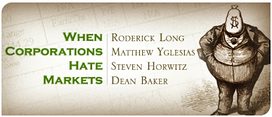As our conversation draws to a close (at least within the context of this forum), areas of disagreement unsurprisingly remain. Matthew Yglesias and I disagree as to whether the theoretical case for free-market solutions is systematic or piecemeal; Steve Horwitz and I disagree on the extent to which Wal-Mart and similar firms owe their success to government intervention; Dean Baker and I disagree about the relative merits of reformism versus abolitionism (he’s worried about making the perfect the enemy of the good, while I fear that gradualism in theory is perpetuity in practice – though for the record I do agree with Baker that his reformist proposal would be preferable to the current system).
But we can all agree that there are a lot of government policies that systematically promote corporatism, that these policies are often cloaked in deceptive free-market rhetoric, and that we need more cooperation and dialogue between libertarians and the left on these matters.
As regards strategies for addressing the problem, we may or may not agree on which politicians to vote for, which concrete policy reforms to support, or whether to work within the political system at all. But there is one all-purpose strategy to which we can all usefully contribute, regardless of which further approaches we favor – namely to get the word out. We don’t have to keep letting either nominally pro-market or nominally anti-market propagandists get away with conflating corporatist policies with free-market ones. The more loudly and consistently we explain the distinction, point out instances of conflation, and delineate the ways in which government policies directly or indirectly prop up big business, the harder we can make it for corporate interests to use the language of free enterprise to gain political privilege.

